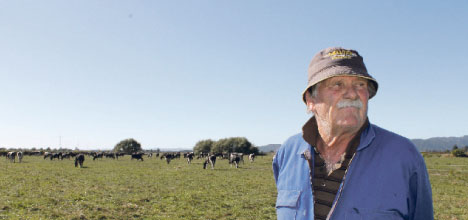Peter Berryman has an inquiring mind and an independent nature which is partly why he is regarded by some as an unconventional farmer.
Not that it worries Peter because his apparent lack of convention has seen his Otakiri dairy farm consistently perform above the district average.
Observation skills are an important part of farm management,
Peter Berryman believes.
For Peter, the basis of successful farming and healthy animals begins with healthy soil. 'In the early days if MAF told me to do something, I was just as likely to do the opposite if I thought it didn't make sense,” says Peter who draws on a lifetime of farming and observation skills to inform his decision making. Since 1969 Peter and his wife Robin, a sheep farmer's daughter from the South Island, have farmed and raised a family at Otakiri.
Sharemilking
Today their daughter Liz and her husband Danny Henman are sharemilking 200 cows on the 70ha property which last season produced 38 per cent more milk solids per hectare than the district average.Liz, who studied agriculture at Massey University and returned to the Whakatane district as an ag-tutor, says she didn't fully appreciate how innovative her father's methods were until she left home and saw what other farmers were doing. 'He's pretty amazing in what he's done and the knowledge he has. One of the things both my parents are very strong on is the power of observation, looking at what the living things are telling you – the soil, the pasture and the animals,” she says. Danny too is happy to learn from Peter and to trust his judgement, even though his practices of not grazing pasture too hard, and not using nitrogen fertilisers, are different from most industry recommendations.
The Berryman family links to the district go back to 1925 when Peter's father purchased a farm in the Te Teko - Onepu area and later the Otakiri farm. When he left school Peter initially worked on that family farm before going to the South Island to try his hand shepherding and as a commercial fisherman. 'Forty-five years ago during the storm which wrecked the inter-island ferry the Wahine, I was on a 40 foot trawler off the South Canterbury coast with two of us on board. It took 11 hours to get into port instead of the normal one.”
When Peter and Robin returned to the family farm, Peter began turning his attention to farming the soil as well as the livestock. 'You need a good root system to have good pasture. Some of our grasses have roots 900mm deep.” Every year Peter re-sows some of the pasture with a mix of grasses, clover and chicory. He has always used lime and dolomite, and six years ago replaced Muriate of Potash with Sulphate of Potash. 'I don't want to use anything which will kill the bacteria in the soil. We never have a problem with insects like black beetle and not too much trouble with weeds either.”
From 2004 Peter has worked with Peter and Coralie Burton of Eco-Logic Soil Improvement, applying their products CalciZest and DoloZest as part of a total nutrient package each season. Peter Burton invited the Berrymans to be part of a research programme to determine whether the fertiliser practices on their farm reduced nitrate nitrogen leaching to ground water.
Flux meters
In March 2011 flux meters, essentially specially-designed pipes buried in the ground, were installed on the Berryman farm and on a neighbouring property which uses a conventional fertiliser programme. Monthly water samples were taken from the flux meters and independently analysed.
During a twelve month period the Nitrate N levels from the Berryman property averaged less than 5mg/L, markedly lower than those from the neighbouring farm.
Peter Burton says the Ministry for the Environment classes levels less than 5.65mg/L (g/m3) as acceptable from an environmental view point. While the research was initiated and funded by Eco-Logic as part of the company's own on-going research and development, it attracted the attention of the Rotorua Lakes and Land Trust, a collective of Taupo Federated Farmers and Te Arawa Federation of Maori Authorities focused on improving water quality in Rotorua lakes and the Waikato River.
Last year the trust commissioned AgFirst, an independent farm consultancy group, to undertake an assessment of the performance of the Berryman property compared to district average. The AgFirst study showed that the Berryman property in the 2011/12 season produced more kg of milk solids per hectare from pasture than the N driven property.
Using the overseer method of assessing pasture growth, the Berryman farm produced 19,300 kg DM/ha last season compared with the industry average of 14,800. Production has dropped on the Berryman farm this year to about 14,000kg DM/ha and cows were on once-a-day milking from March because of the drought which affected farmers throughout the district.
Less feed
The AgFirst report figures also showed the Berryman's cows required 21 per cent less feed to produce a kilogram of milksolids compared to district average figure for a kilogram of milksolids, with a gross margin advantage of 38 per cent providing $1,621 more per ha for the season.
The Berryman property applied 16kg of nitrogen per hectare compared to the district average of 96kg N/ha, however, the important point says Peter Burton is that the Berryman farm is not suffering in terms of pasture growth and milk production by failing to use nitrogen fertilisers. While Eco-Logics own findings support the use of its products, Peter says that's not the over-riding objective. 'We want what's best for New Zealand and New Zealanders now and into the future. All the water we are ever going to have is here now so we should look after it, rather than trying to clean it up after we've made a mess of it.”



0 comments
Leave a Comment
You must be logged in to make a comment.